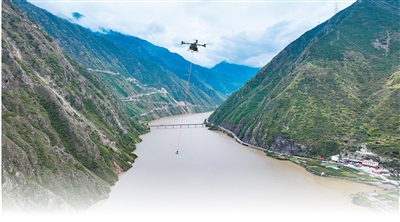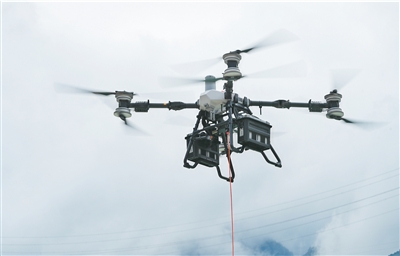




- BRNN
- BRI News
- BRNN News
- Database
Official Documents Polices and Regulations
Inter-government Documents International Cooperation BRI Countries
Business Guide Economic Data BRI Data
Trade
Investment Projects Latest projects
Cases - Content Pool

A DJI cargo drone flies over the Dadu River in Luding county, Ganzi Tibetan Autonomous Prefecture, southwest China's Sichuan Province, Sept. 11, 2025. (People's Daily Overseas Edition/Yang Junfeng)
Jiaowu village, deep in the mountains of Luding county, Ganzi Tibetan Autonomous Prefecture, southwest China's Sichuan Province, was once cut off from the outside world. Home to more than 800 households and about 2,000 residents, the settlement long struggled with transportation and connectivity.
From Sept. 11 to 12, DJI Delivery held a media exchange event in the village. During a live demonstration, a DJI FC100 cargo drone carrying an 80-kilogram power insulator soared across the Dadu River and up a steep peak in just 15 minutes—a journey that would take workers six hours to climb on foot.
This single flight represented more than an upgrade in logistics—it signaled new development prospects for remote mountain areas. Domestically produced cargo drones are helping transform once formidable natural barriers into accessible routes.
In Luding, drone-based low-altitude logistics now extends well beyond power grid operations into everyday life.
The county has established fixed drone launch and landing sites, enabling postal workers to operate the FC100 daily. Deliveries that once took one to two hours can now reach Jiaowu village in just over 10 minutes.
As an industrial-grade unmanned aircraft, a cargo drone serves not only as an accelerator for low-altitude logistics but as an essential productivity tool in mountainous regions and other demanding environments, said Jin Hao, sales director at DJI Delivery.
Across Ganzi Tibetan Autonomous Prefecture, DJI cargo drones have been applied in three major areas—power transmission, emergency rescue, and logistics in mountain areas—demonstrating both technological maturity and broad adaptability.
Tian Li, a transmission line maintenance engineer on the western Sichuan plateau, has used drones for over a decade.

Photo shows a DJI FC100 cargo drone. (People's Daily Overseas Edition/Yang Junfeng)
"DJI cargo drones have never stopped operations due to malfunctions," he said. "In the past, we carried loads up steep slopes for two to six hours to reach work sites at altitudes of several thousand meters. Now, drones can deliver materials in just over 10 minutes."
Smart technologies have made these flights "plannable and manageable." During the on-site demonstration, the FC100—managed via DJI DeliveryHub, a one-stop air logistics platform—achieved one-click route planning. Once loading and unloading sites were set, the drone automatically generated a flight path, streamed real-time data including payload, battery level and altitude, and returned autonomously after completing its mission.
"If 100 drones are flying simultaneously in low-altitude airspace, they can't each go their own way—they'll need designated 'air lanes' just like roads," Jin explained. "DJI DeliveryHub provides this kind of air traffic management, ensuring that every flight path is controllable and traceable."
"DJI's move into cargo logistics isn't about following trends—it's about responding to national needs. The harsher the conditions, the clearer the value of drones becomes," Jin added.
Over the next three to five years, scaled low-altitude cargo applications are expected to expand rapidly—from transporting oxygen cylinders on Mount Qomolangma to delivering express parcels across the Yangtze River and reaching remote mountainous communities.
Cargo drones will also see their applications in ports, mines, construction sites and urban emergency logistics.
In southwest China's Yunnan Province, drones now handle power line maintenance through tropical rainforests, replacing workers who once carried nearly 50 kilograms of materials.
On Mount Huangshan in east China's Anhui Province, drones have transported 1.5 million kilograms of hotel supplies, replacing traditional porters.
In major bamboo-producing areas of Mabian and Muchuan counties in Sichuan, drones can transport one tonne of bamboo for just about 100 yuan (about $14.05), far cheaper than vehicle delivery.
Beyond basic transport, cargo drones are increasingly multifunctional—capable of carrying X-ray equipment for power line inspection or de-icing robots that shuttle along cables in freezing weather.

Tel:86-10-65363107, 86-10-65368220, 86-10-65363106